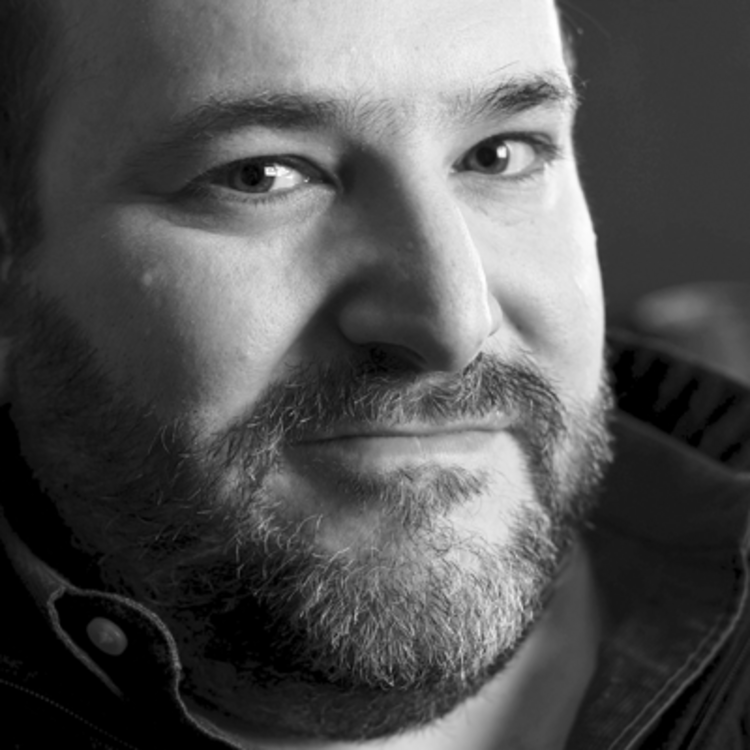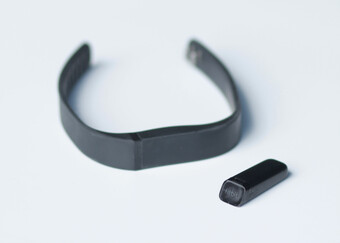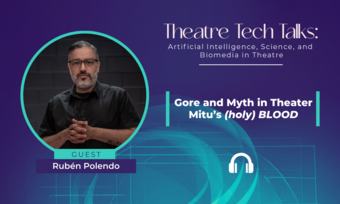Techne
Getting Fit
We often consider technology an imposition on both our craft and our business: social media putting pressure on everything from marketing to performance, for example, or IT budgets draining resources from “more important” work. But the etymological root of technology is techne: the Greek word for art. To paraphrase cartoonist Walt Kelly, we have met the enemy, and it is us. Every month, this column will investigate the ways in which technology can inspire us, transform us, and help us chart a new course in the 21st century. Thanks for—to use a radio metaphor—tuning in.
For Hanukkah this year, my mother gave me a Fitbit. It’s a small monitor you keep clipped to your clothing all day long. While you wear it, your Fitbit gathers data on your day’s activity, passively recording the number of steps you take and floors you climb, the amount of calories you burn, the duration and quality of your sleep, and the total distance you cover on foot. One quick tap reveals your progress against daily fitness goals at any time. (You can also log into your Fitbit dashboard online to track your progress over time.) Checking it periodically throughout the day lets you know whether you’ve done enough for your health. Are you stuck at a low number of steps by 5 pm? Take a walk before dinner to catch up. It’s radically simple…and effective.
(Oh, and the Fitbit lights up now and then with little encouraging messages, too. I love it with all my heart.)
The truth is, I’m a sucker for the well-timed arrival of useful data: just the right information, just when you need it. It’s the surest way, if you ask me, to make any system work…or work better. Let me give you an example from another non-theatrical part of my life.
Not long ago, my wife and I decided that we could probably do a better job of limiting the number of purchases we put on our credit card every month. (Who among us doesn’t want to spend less nowadays?) We started by recording the amount of each bill in a spreadsheet and discussing how well we’d done (or not) at the end of every month, setting some goals for the next thirty days…but we really didn’t make much progress. So then we tried a simpler low-tech approach: we bought a small whiteboard and began using it to record every single purchase we made on our credit card immediately after we made it. Watching the running total creep up throughout the month immediately made us super-intentional about every purchase. The result: a 33% decrease in our spending.
Over the last few days—often while I’m walking on the treadmill, trying to hit my step goal for the day—I’ve been thinking about the fact that we really don’t get very much well-timed useful data at all in the theater. For example, let’s think about one obvious piece of information we all care about: ticket sales.
When do you currently find out how well a show is selling? Maybe a month before it opens, you start to get some idea, right? And the really accurate data comes after each performance, when you can include walk-up sales. (The really really accurate data comes after the whole run of a show, of course, when you can calculate total sales after the fact.) By the time sales data arrives, just about the only effective thing you can do with it? Change your ticket prices. If a show’s just not selling well at all—or if it IS selling well, but you’ve already booked another show in the same space and can’t extend—the information’s getting to you way too late. It’s the rough equivalent of my wife and I analyzing our credit card bills after we’ve finished using our credit card.
(Ticket sales are a measure of demand. What if you could get that measure of demand before you even programmed the show? Of course you would. Does it seem possible, though? While we labor under the currently dominant season planning model, it might not be. But if we started allowing audiences to demand performances… Well, I’ll save that for a future column.)
So… what are some useful data we might theoretically be able to collect in the theater with something like a Fitbit?
The best thing I think we might be able to measure (even if somewhat roughly or imperfectly) is impact. A Fitbit can detect when a person is fidgeting. Wouldn’t you like to know how still, on average, your audiences were sitting? And which exact moments in a show were making them most squirmy? What if you could measure that sort of thing while a script was still in development, even? Might it help you make creative changes?
Furthermore, while a Fitbit can’t measure galvanic skin response (GSR)—the conductance of one’s skin, which is a fairly good measure of psychological arousal—other simple devices can. Again, wouldn’t you like to know precisely when your audiences were particularly excited? What’s really compelling about the thought of being able to measure GSR is the fact that it’s demonstrably more accurate at revealing how people feel than any kind of post-show survey would be. Human memory is notoriously unreliable; we begin constructing and reconstructing how we think we experienced an event mere moments after it’s over. GSR, by contrast, doesn’t lie.
Might it not be interesting or useful to detect when people’s gazes started wandering from the main action on stage? What about recording the images that audience members find particularly riveting?
Imagine another similar device that would detect where on stage an audience member was focusing his or her gaze. Except…you don’t have to imagine that. It’s current technology. Time Warner has been doing it for at least a year, and a few other studios have begun to experiment as well…but has anyone tried it in the theater? Might it not be interesting or useful to detect when people’s gazes started wandering from the main action on stage? What about recording the images that audience members find particularly riveting? Google Glass would probably make that relatively easy.
Finally, let’s take the idea one (very speculative) step further. While a Fitbit is designed to help us maintain our physical fitness…what if people wore a similar device intended to help us improve our artistic fitness? Suppose a small monitor clipped to your sleeve could passively record the number of hours you spent reading (and the subjects you read about), the television programs you watched, the videos you streamed online, the museum exhibits you visited, and of course the plays you went to. What if we could know, with a quick tap, how little or how much culture we’d engaged with in a given day or week or month? Wouldn’t it potentially help us all make better decisions about how to spend our time? To exercise, as it were, our souls? I’d like to think it would.










Comments
The article is just the start of the conversation—we want to know what you think about this subject, too! HowlRound is a space for knowledge-sharing, and we welcome spirited, thoughtful, and on-topic dialogue. Find our full comments policy here
This is a means to what end? To Frankenstein the perfect play that will be able to manipulate an audience to be looking precisely where we want in any given moment? To laugh only when we intend them to do so? To fidget only during scene transitions? Imagine if we had the time, talent and wherewithal to create and maintain this sort of technology, but instead applied the time, talent and wherewithal to the creation of art that we believe in, based on the hearts and souls of the artist/creators. That can be some amazing theater. But it won't be for everybody because nothing is. People will always fidget, laugh inappropriately, gaze at the vase on stage left when the action is occurring stage right. And that is ok. It's all ok. It's part of the experience.
Like David and, I suspect, other readers, I find this sort of technocratic "solution" deeply troubling and creepy. As a director, no, I do not want to track my audiences to learn when their attention is drifting. I rely on my own instincts during the rehearsal process to tell me that. This is a wish list of enhanced focus group techniques. Yes, they may better give audiences "what they want," but to borrow from the Stones, artists might not always deliver what audiences want (or think they want), but if they try sometimes, they might find, they give them what they NEED.
So maybe you might use the data differently. Maybe you'd seek out the moments that make people uncomfortable and emphasize them. Or find the ones that aren't doing that and tweak them. It's just information. It's neutral.
I'm not interested in giving people what they want as a blanket approach. I'm interested in knowing, really, how what we're giving people affects them. Our instincts are limited, as has been carefully demonstrated in any number of laboratories; they're good in some ways, misleading in others. Data would offer a counter-balance.
And then we can feed all of the data we collect into a 21st century algorithm which will write, design, cast and stage the ultimate play which will be produced everywhere forever after.
Now you're just being silly. :)
Um, no.
But that would make for an excellent episode of Max Headroom.
What are you saying no to?
The implications are positively Orwellian. I do not want that kind of information tracked. Hence the Max Headroom reference to a future where television ratings are measured 1:1, second by second.
As for recording what on a stage an audience finds riveting, who cares? What if it changes from night to night? What if we try to adjust our blocking to what the data tells us? That effectively means the audience is blocking the show or approving design work, right? And how does that serve us in terms of making/writing/blocking/directing/designing art that's supposed to be ours? That's much worse than letting the audience dictate what plays you program.
You know I love technology, and I love bringing technology into theatre & vice versa, but no. Just no.
I have to say: my first response to your negative reaction is that I must be onto something good.
What's wrong with adjusting blocking to increase an audience's interest in a show? Isn't that, in part, what we're already doing anyway, but without any real information about whether we're successful or not?
Why does the art have to be "ours" in the first place? That's a rather 20th-century notion, I fear. One that the last few decades have begun to call into at least some question.
It's not so much a negative reaction as an amused sigh.
Creative issues aside, I don't want to be tracked, period. I don't use store loyalty cards, for example. I don't want offers customized to my purchases, nor would I want to track my cultural intake per day. I usually ignore Amazon recommendations, often because it's smart enough to know I like a certain author yet too stupid to realize that if I'm buying the 48th book in a series, there's a good chance I probably have the first 47. And they're good at this kind of thing. It also takes the joy of browsing out of the equation--I don't know how many books or films I've stumbled on by chance, things I might never have sought out or given a second thought, but then fell in love with after reading or watching a bit. There's no algorithm for chance, thank goodness.
More to the point, this points towards groupthink dictating the artistic choices. We know from tv ratings how this leads to unusual or niche programs vanishing. How does this sit side-by-side with your anger at DC theatres choosing homogenous white-male-playwright/white-male-director seasons? They're just following what their audience data is telling them, right?
As for the art being "ours," well, then let's just forgo playwrights or directors. Throw some dell'arte figures up there with a menu of actions & stories, let the audience go for it. (Which could be fun, actually, but not for every production.) In theory, there is a reason why we do this, why some people go to the trouble of writing a script or wanting to stage it. Not everyone can do that. Not everyone wants to. And I'd much rather see Bob Falls' Iceman Cometh than March 19th's Audience's Iceman Cometh. "Hickey stands by the bar too much." "Hickey doesn't stand by the bar enough."
But, as always, I'm troubled by the assumption that an audience watching a show is passive. If they're unconscious, then maybe. Otherwise, they will affect the show. No two performances are ever the same. And we know if an adjustment works from the way they react in the moment. Sometimes, we can adjust and calibrate within the performance. That's also why we're able to get up as playwrights, directors, actors, etc and do this kind of thing where many do not.
What if audiences for "The Butcher" consistently decided that they'd prefer it if were about a dog-walker, maybe a white female fresh out of college, and it were set in Hawaii? That's not the story you set out to tell, not by a longshot. Might be a good story, might even be one you'd like to tell someday. But it's not the story you chose put on the stage this time. Maybe that audience should go out and raise the money to put that production together.
I want to see the story you chose to tell. I want to see how Bob Falls chose to bring O'Neill to life.
Though I will say, I'm ready for Hawaii at this point. Too much snow this year...cut that for tomorrow's performance.
I should never be surprised any more by how conservative your artistic tastes any more. Fool me once, shame on you... won't get fooled again :)
There's a lot to respond here -- more than I have time to engage with before my son gets up from his nap -- but I want to say that I think the theaters in DC are precisely doing the opposite of listening to their data. They are retrenching themselves in the familiar. The data -- declining audiences -- would seem to demand a different approach.
Other than that: I think you've got a bit of an all-or-nothing mindset here that I don't share. Gauging audience reaction doesn't mean turning the entire show over to them. There are many increments in between that you seem to be eliding...
Nap time's over!
Snort. That's different data. They're not listening to what declining audiences are ignoring, they're listening to what's still selling. They're following the hard numbers they have.
Of course, I'd also argue that people are finding better ways to spend their entertainment money to get more bang for their buck. For example, I have Netflix, Hulu Plus, and Tunnelbear for about $20 a month combined. (And no, Netflix and Hulu aren't very good at recommendations either.)
You're also making a big assumption about my artistic tastes there. I'm open to anything, it's one thing I love about the Humana Festival.
But I don't think I have an all-or-nothing mindset--if I did, I'd dismiss this out of hand. Just like the social media integration into plays, I can see all kinds of possibilities in Google Glasses for patrons. But far more interesting to use it in the actual storytelling than in collecting data, i.e. being able to see characters who aren't physically on the stage, seeing flashbacks/memories of characters, etc.